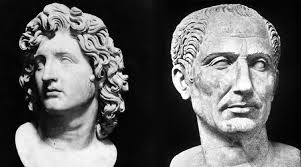Tag Archives: Cleopatra
By Jocelyn Hitchcock, Contributing Writer, Classical Wisdom It’s no secret that women are vastly underrepresented in the historical record. Biographical information, even about some of the most prominent women like Cleopatra, is often gleamed from tangential accounts focused on male counterparts. Of course this doesn’t mean that women did not making massive contributions to arts,
The Eternal City
Written by Brendan Heard, Author of the Decline and Fall of Western Art The Ptolemaic Dynasty of Egypt is a unique reference point in classical history. Most notably, our very notion of classical wisdom itself largely depends on this period, insofar as it played a role in the documentation, preservation, and accumulation of the wisdom
The Birth of the Biography
By Ben Potter, Contributing Writer, Classical Wisdom What springs to mind when we think about literature of the Ancient World? Maybe it’s Homer’s Achilles dragging the corpse of Hector around Troy or Sophocles’ Oedipus stabbing out his polluted eyes. Perhaps it’s Plato’s Socrates holding forth or Herodotus’ Leonidas and his 300 Spartans. It even might
Ancient Alexandria, Egypt

By Jocelyn Hitchcock, Contributing Writer, Classical Wisdom The Egyptian city of Alexandria was established in 331 BCE by its Eponymous founder, Alexander the Great. Despite its humble beginnings as a port city, Alexandria developed into one of the most prosperous metropolitan areas in the ancient world. It grew to boast such wonders like the library
Caesar and Alexander: The Story of Two Leaders

By Giuseppe Aiello, contributing writer, Classical Wisdom It is the year 69 before Christ. Gaius Julius Caesar, now more than thirty, is located in Cadiz, the ancient Gades of Punic origin. Here, one step away from the famous Gates, where the Mediterranean flows into the ocean, the Roman wanders around the temple dedicated to Hercules,
The Passion of Dido
By Mary E. Naples Commissioned by none other than Gaius Julius Caesar Augustus after his decisive victory at Actium over Antony and Cleopatra, Virgil’s Aeneid is a patrilineal tale tracing the pedigree of the Italic people from the mythical, stalwart Trojan heroes. A glory to the Trojans and the Romans alike. Indeed, both the Trojan








